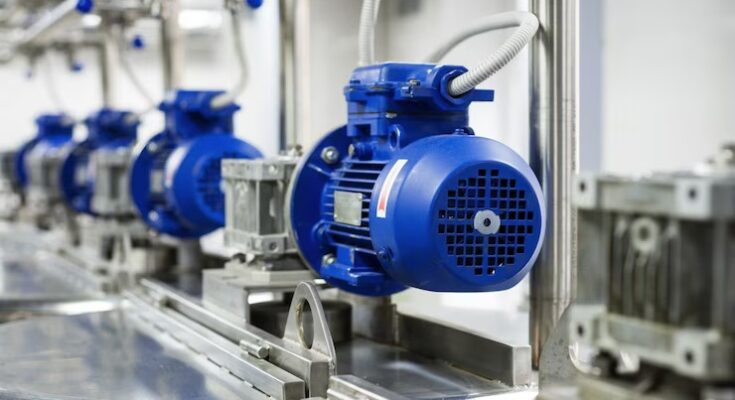Industrial pumps are essential for various applications, from manufacturing and chemical processing to water treatment and oil extraction. Choosing the right pump for your specific needs can significantly impact the efficiency and reliability of your operations. In this guide, we will explore the most popular pumps for industrial use and their key features.
Centrifugal Pumps
Centrifugal pumps are among the most widely used industrial pumps due to their versatility and efficiency. They operate by converting rotational kinetic energy into hydrodynamic energy, which moves the fluid.
Applications
Centrifugal pumps are ideal for:
- Water supply and distribution
- Chemical processing
- Food and beverage production
- HVAC systems
Key Features
- High Flow Rate: Suitable for applications requiring large volumes of fluid.
- Simple Design: Easy to maintain and repair.
- Variety of Configurations: Available in single-stage and multi-stage designs for different pressure requirements.
Positive Displacement Pumps
Positive displacement pumps move fluid by trapping a fixed amount and forcing it through the pump. They are ideal for applications requiring precise flow control and high pressure.
Types of Positive Displacement Pumps
There are several types of positive displacement pumps, including:
Gear Pumps
Gear pumps use interlocking gears to move fluid. They are known for their reliability and ability to handle viscous fluids.
Applications:
- Lubrication systems
- Chemical processing
- Hydraulic applications
Diaphragm Pumps
Diaphragm pumps use a flexible diaphragm to move fluid. They are suitable for handling abrasive or corrosive fluids.
Applications:
- Chemical transfer
- Food and beverage production
- Pharmaceutical manufacturing
Piston Pumps
Piston pumps use a reciprocating piston to move fluid. They are capable of generating high pressure and are suitable for applications requiring precise flow control.
Applications:
- Hydraulic systems
- Pressure washing
- Oil and gas industry
Submersible Pumps
Submersible pumps are designed to operate while fully submerged in the fluid they are pumping. They are commonly used for dewatering and wastewater applications.
Applications
Submersible pumps are ideal for:
- Wastewater treatment
- Dewatering in construction and mining
- Flood control
Key Features
- Corrosion Resistance: Made from materials that withstand prolonged exposure to water and other fluids.
- High Efficiency: Efficiently move large volumes of fluid.
- Self-Priming: Do not require priming before operation.
Peristaltic Pumps
Peristaltic pumps, also known as hose pumps, move fluid through a flexible hose or tube using a rotating roller. They are ideal for handling shear-sensitive and viscous fluids.
Applications
Peristaltic pumps are suitable for:
- Chemical dosing
- Pharmaceutical manufacturing
- Food and beverage production
Key Features
- Gentle Pumping Action: Minimizes shear and turbulence, protecting sensitive fluids.
- Easy Maintenance: Hose or tube can be easily replaced.
- Self-Priming: Capable of handling fluids with entrained gases.
Gear Pumps
Gear pumps use rotating gears to move fluid through the pump. They are known for their precision and reliability in handling viscous fluids.
Applications
Gear pumps are ideal for:
- Chemical processing
- Hydraulic systems
- Fuel transfer
Key Features
- Consistent Flow: Provides a steady and precise flow rate.
- High Pressure: Capable of generating significant pressure, suitable for demanding applications.
- Durable Construction: Made from robust materials to handle abrasive and corrosive fluids.
Screw Pumps
Screw pumps use one or more screws to move fluid along the axis of the screw. They are known for their ability to handle high-viscosity fluids and maintain a steady flow rate.
Applications
Screw pumps are suitable for:
- Oil and gas industry
- Chemical processing
- Marine applications
Key Features
- Smooth Flow: Provides a continuous and non-pulsating flow.
- High Viscosity Handling: Ideal for thick and heavy fluids.
- Low Noise: Operates quietly compared to other pump types.
Conclusion
Choosing the right industrial pump is crucial for the efficiency and reliability of your operations. The most popular pumps for industrial use include centrifugal pumps, positive displacement pumps, submersible pumps, peristaltic pumps, gear pumps, and screw pumps. Each type of pump has its unique features and is suitable for specific applications.
When looking for pumps for sale, consider the specific needs of your application, including the type of fluid, required flow rate, and pressure. By understanding the key features and applications of different pumps, you can make an informed decision and select the best pump for your industrial needs. Investing in the right pump will ensure efficient and reliable performance, minimizing downtime and maintenance costs.By choosing from these popular options, you can find pumps for sale that meet your operational requirements and contribute to the success of your projects. Whether you need pumps for chemical processing, water treatment, or oil extraction, selecting the right pump is essential for achieving optimal performance and longevity.




